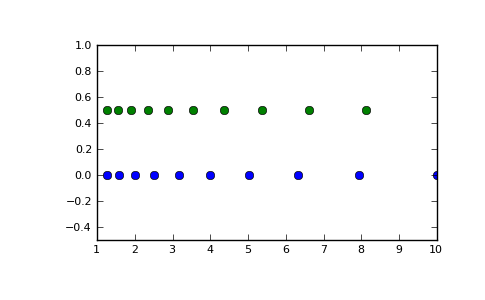numpy.logspace¶
- numpy.logspace(start, stop, num=50, endpoint=True, base=10.0)¶
Return numbers spaced evenly on a log scale.
In linear space, the sequence starts at base ** start (base to the power of start) and ends with base ** stop (see endpoint below).
Parameters: start : float
base ** start is the starting value of the sequence.
stop : float
base ** stop is the final value of the sequence, unless endpoint is False. In that case, num + 1 values are spaced over the interval in log-space, of which all but the last (a sequence of length num) are returned.
num : integer, optional
Number of samples to generate. Default is 50.
endpoint : boolean, optional
If true, stop is the last sample. Otherwise, it is not included. Default is True.
base : float, optional
The base of the log space. The step size between the elements in ln(samples) / ln(base) (or log_base(samples)) is uniform. Default is 10.0.
Returns: samples : ndarray
num samples, equally spaced on a log scale.
See also
Notes
Logspace is equivalent to the code
>>> y = linspace(start, stop, num=num, endpoint=endpoint) >>> power(base, y)
Examples
>>> np.logspace(2.0, 3.0, num=4) array([ 100. , 215.443469 , 464.15888336, 1000. ]) >>> np.logspace(2.0, 3.0, num=4, endpoint=False) array([ 100. , 177.827941 , 316.22776602, 562.34132519]) >>> np.logspace(2.0, 3.0, num=4, base=2.0) array([ 4. , 5.0396842 , 6.34960421, 8. ])
Graphical illustration:
>>> import matplotlib.pyplot as plt >>> N = 10 >>> x1 = np.logspace(0.1, 1, N, endpoint=True) >>> x2 = np.logspace(0.1, 1, N, endpoint=False) >>> y = np.zeros(N) >>> plt.plot(x1, y, 'o') >>> plt.plot(x2, y + 0.5, 'o') >>> plt.ylim([-0.5, 1]) >>> plt.show()

